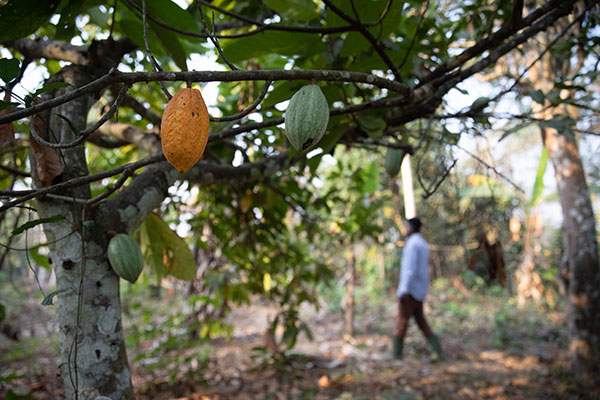I am a third-generation cocoa farmer from one of the world’s biggest producers of the beans. I have farmed my whole life, having helped my family who are also cocoa farmers from Ghana’s Ahafo region. I became a member of Fairtrade co-operative, Kuapa Kokoo Farmers Union, in 2020 when I got my own farm, the land is about three acres.
For my parents, cocoa was the main source of income. Back then the weather was perfect for producing two healthy, harvests of cocoa a year (in June and October) the yields were sizeable, and it was profitable enough. Today it is much harder. There has been a drastic change in cocoa production because of climate change. The environment is perfect for pests and diseases, like swollen shoot or black pods, and unpredictable rains and very hot sun causes plants to die.
I love nature a lot, I have a great passion for agriculture but now it is quite difficult being a farmer. I remember when I was young, we were in tune with the seasons, my grandfather used to say you need to come back home at a particular time because it will rain, and if you didn’t, you got wet in the fields. But today when you see clouds forming and you think the rains will come, they don’t.
Harvests are impacted by the weather, and production has reduced because the rainfall pattern has changed. When we need rain for our cocoa flowers to produce seed for us, it doesn’t come, and then at the time we don’t expect the rain, when our plants are already producing pods, a deluge might wash them away.

If fields are infested with diseases they need to be cut down and the hot sun causes plants to shred their leaves and flowers so by last October, which is when we are supposed to get our main harvest, we had a record low production.
We are losing almost everything; people make nothing. My income has dropped about 70-80 per cent. On a normal one-acre cocoa farm you should harvest about a tonne at the end of the season, or 16 bags, today, the most you can harvest is two to three bags.
Many people depend only on cocoa, it is our cash crop for export, so at the end of the cropping season a poor harvest means surviving the rest of the year is difficult.
For me, being part of the co-operative helps, but the problem was so significant that Fairtrade Africa, with funding from a range of partners, introduced a project for young people who want to stay in farming.
By applying a dynamic agroforestry approach, we are now adapting to and mitigating against climate change.
This new project means we are going organic, we are learning about diversification and afforestation. We plant crops that make the soil moist or retain water. For one hectare we get more than one thousand trees, timber to help offset carbon and mango, avocado, orange trees for nutrients, and annual crops like yam, cassava, plantain, maize, vegetables.
This means that we no longer have to buy these crops from the market, we get them from our farm. There is a cool breeze on my farm because the trees create shade and we know how to manage our farm better, for example pruning and mulching and testing soil PH levels has helped our cocoa crops grow.
So it is my hope that we can extend this project to my neighbours and that next year the harvest will be better but we need more climate finance to make that happen.












How inspiring to read that with the help of Fairtrade Africa these farmers have a future. To work with the land, learning how to manage crops and the soil that protects them.
Everyone deserves a chance to live a full productive life. These farmers, with hard work will achieve their goals. Brilliant.